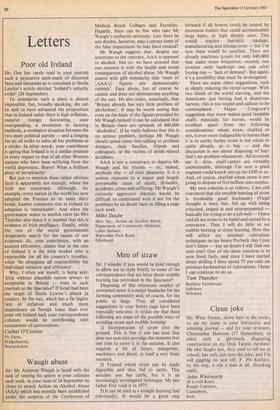Men of straw
Sir: I wonder if you would be kind enough to allow me to reply briefly to some of the correspondence that my letter about stubble burning has provoked in the Spectator?
Disposing of this enormous surplus of unwanted straw is a major headache for the farming community and, of course, for the public at large. Thus all considered suggestions in your letters page have been especially welcome. It strikes me that these following are some of the possible ways of avoiding straw and stubble burning: 1) Incorporation of straw into the ground. This is fine if one has land that does not turn into porridge the moment that one tries to move it in the autumn. It also requires a lot of hours, manpower, machinery and diesel, in itself a very finite resource.
2) Treated wheat straw can be made digestible and thus fed to cattle. This assumes one has cattle, but it is an increasingly investigated technique. My late father first tried it in 1975.
3) It can be used as a straight burning fuel (obviously). It would be a great step forward if all houses could be heated by enormous boilers that could accommodate large bales, or high density ones. This would require fantastic haulage, manufacturing and storage costs — but I'm sure these would be justified. There are already machines (yours for only £40,000) that make straw briquettes; recently one investor went bankrupt one year after buying one — 'lack of demand'. But again, it's a possibility that must be investigated.
There are many other suggestions, such as simply reducing the cereal acreage. With two thirds of the world starving, and the Americans just having had a disastrous harvest, this is too stupid and callous to be
contemplated. Major Congreve's suggestion that straw makes good feedable chaff, especially for horses, would be excellent apart from the following considerations: wheat straw, chaffed or not, is even more indigestible to horses than it is to cattle; barley straw is fed whole to cattle already, as is hay — and the discussion is not about disposing of hay: that's no problem whatsoever. All livestock eat it. Also, chaff-cutters are virtually unobtainable, although I'm sure a good engineer could knock one up for £350 or so. And, of course, chaffed wheat straw is not going to dispose of five million tons surplus.
My own solution is as follows. I am still convinced that the sensible burning of straw is invaluable good husbandry (Virgil thought it was), but, fed up with being criticised, sniped at and misrepresented — basically for trying to do a job well — I have sold all my straw to be baled and carted by a contractor. Thus I will do little or no stubble burning or straw burning. How this will affect my minimal cultivation techniques on my heavy Purbeck clay I just don't know — but no doubt I will find out next year! One of my main concerns is to save fossil fuels, and since I have started direct drilling I have saved 75 per cent on previous husbandries of cultivations. I hope I can continue to do so.
Tom Thatcher
Buxbury Farmhouse, Salisbury, Wiltshire










































 Previous page
Previous page